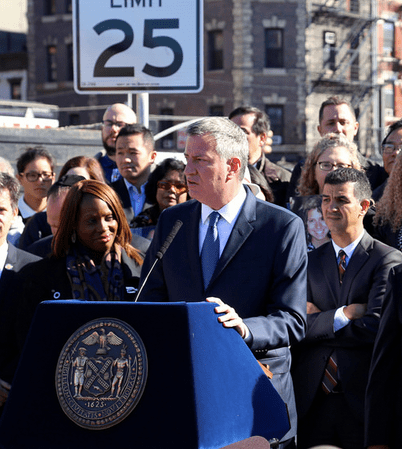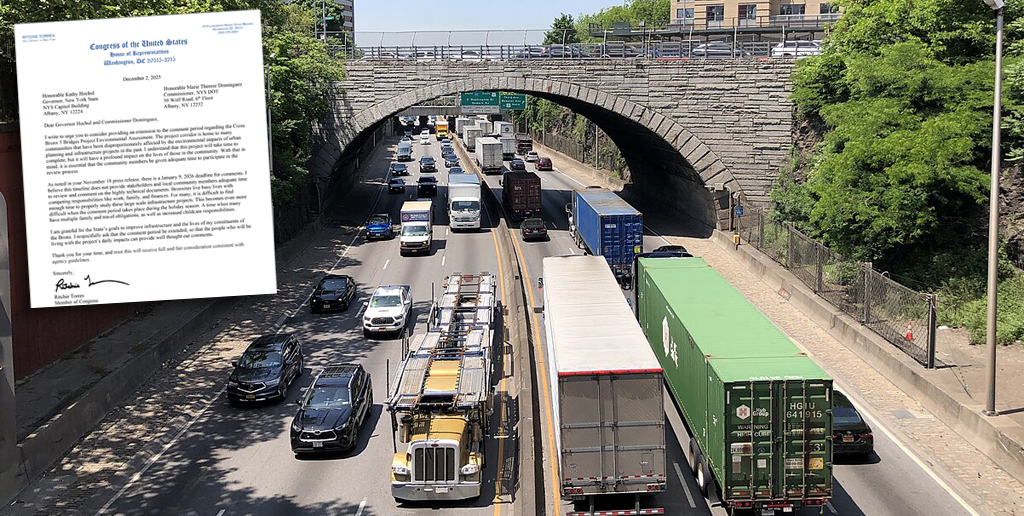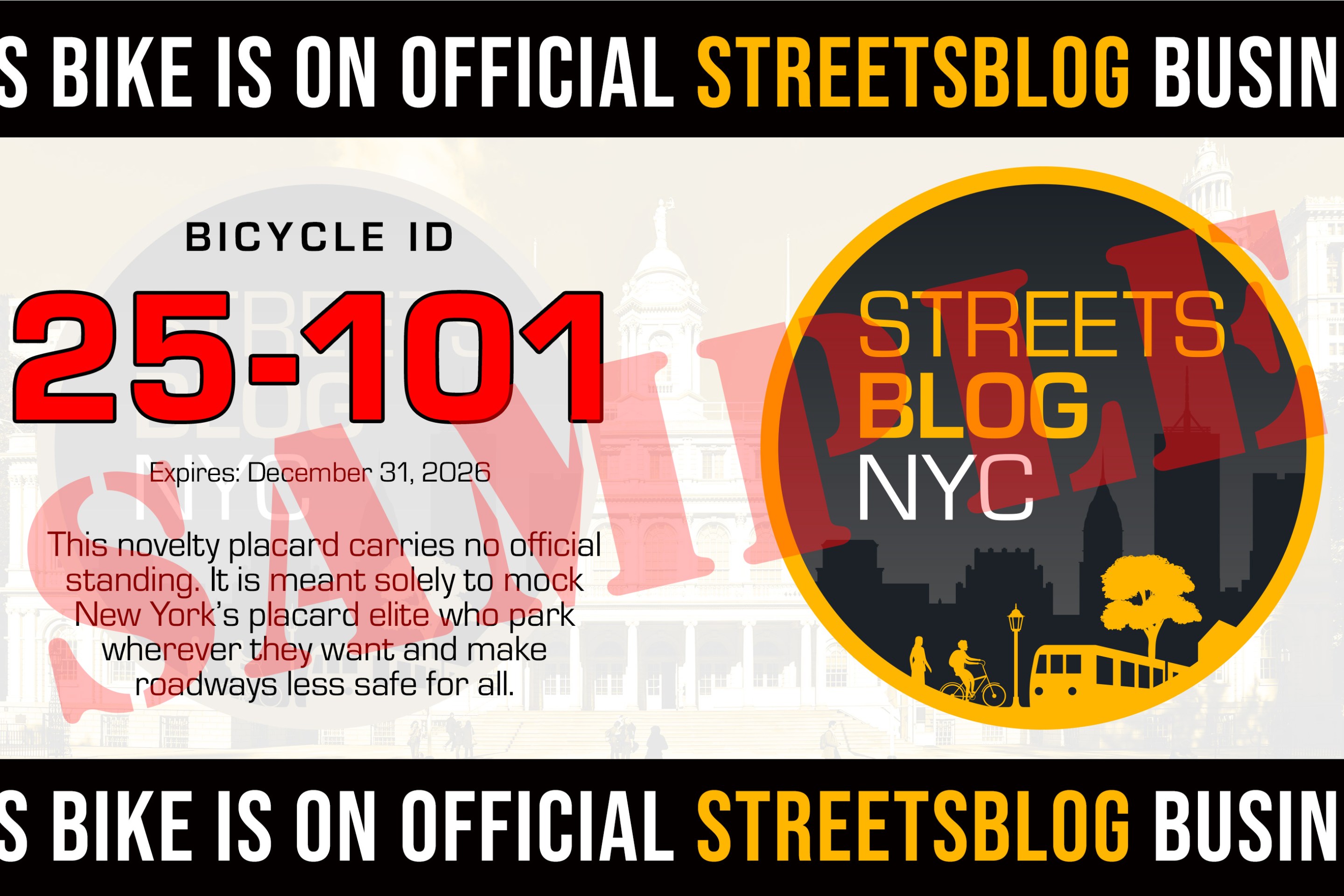Well, that was quick. Two nascent safety camera programs on Long Island have been shut down, despite demonstrable success in Nassau, after elected officials turned tail in response to complaints from law-breaking motorists. Meanwhile, red light cameras in New Jersey were turned off this week after that state's five-year demonstration failed to secure renewal in the legislature.

Suburban representatives, many facing election in less than a year, see these setbacks for street safety as politically advantageous. But in New York City, the politics of automated enforcement appear to be different -- the gradual rollout of more speed cams has not triggered such an organized backlash. Still, the reversals on Long Island not only imperil people in Nassau and Suffolk, they also threaten to make it tougher for NYC to strengthen its safety camera programs via Albany legislation.
This summer, Nassau County quickly rolled out a speed camera program that stirred up a hornet's nest of motorist entitlement. County Executive Ed Mangano unsuccessfully tried to wrangle an insurgency that started with county Democrats and quickly spread to his fellow Republicans. He trimmed the cameras to just four hours a day before caving in completely to demands from county legislators that the program be eliminated. Across the border in Suffolk County, speed cameras hadn't even been turned on before elected officials caved to pressure from motorists and stopped the program in its tracks.
"It's not surprising," Mangano told Newsday. "It's an election year."
The situation on Long Island stands in contrast with speed camera deployment in New York City, where the rollout has been gradual. By the end of the year, the city aims to have fewer than a third of the 140 cameras allowed by Albany out on the streets. The additional cameras have been accompanied by major publicity surrounding the city's new 25 mph speed limit and an increase in the number of speeding tickets issued by precinct officers, up nearly two-thirds compared to last year [PDF]. These changes have all been framed within the context of the city's larger Vision Zero initiative to eliminate traffic fatalities.
"I haven’t heard much opposition in New York City, mostly because of how it’s been handled," said Tri-State Transportation Campaign Executive Director Veronica Vanterpool, who testified in favor of speed cameras before the Nassau legislature Monday night. "There's been an extensive public education campaign, and I think that made all the difference."
"The Vision Zero context in New York is so strong," said Transportation Alternatives Executive Director Paul Steely White. “That’s something we have that suburban Long Island and New Jersey don’t yet, which really puts cameras solidly where they should be in the context of traffic safety.”
The most notable NYC opposition to speed cameras to date has come from Staten Island, where DOT relocated a camera and refunded tickets after drivers said it was outside the limited areas near schools where state law permits speed cameras. DOT's response seems to have kept Staten Island state senators like Diane Savino and Andrew Lanza, who have both backed safety cameras in the past, from following the lead of their Long Island counterparts and attacking the program in response to constituent complaints.
Update 2:00 p.m.: After publication, DOT spokesperson Scott Gastel e-mailed a statement about the city's safety camera program. It reads, in part: "We pair crash data with speeding data in order to make informed siting determinations. Each location, where fixed or mobile, is thoroughly vetted as an allowable location and we speak with each school affected to determine hours of operation before moving forward with an installation. As we move forward in implementing the entire program we continue to employ a thoughtful methodology in determining locations. It is also important to note the contractor works on a flat fee basis, and is not given a percentage of revenue for each camera, as is the case in some other jurisdictions."
“Safety cameras are an important life-saving measure and I think New Yorkers recognize that,” said Amy Cohen, who helped found Families for Safe Streets after a driver killed her 12-year-old son Sammy last year. Cohen, who joined other families in Albany earlier this year to ask legislators to lower the city's speed limit and expand the number of speed cameras, says she hasn't heard any second-guessing from lawmakers who stood with victims' families just a few months ago.
“In the city, the public support and the elected support is all still there," she said. "We have a leader in New York City who has made Vision Zero a priority and who has said the truth, that this is not about raising revenue. This is about saving lives.”
The de Blasio administration's goal, as stated in its Vision Zero Action Plan, is to enact legislation in Albany that would allow New York City to shape its safety camera program without asking permission from the state for every change. Intermediate steps, like expanding the hours of operation or loosening the state's location and time-of-day restrictions, which limit camera enforcement to tightly defined areas near schools when class is in session, could be more difficult in the wake of Long Island's revolt against automated enforcement. The increase in NYC from 20 speed cameras to 140 moved forward with relative ease in Albany earlier this year because, at the time, Long Island legislators wanted more speed cams too.
NYC's Albany contingent may still be capable of making progress in the next session. The Democrat-controlled Assembly may be sympathetic to a de Blasio policy initiative. Another reason for optimism is that Staten Island's Lanza, one of only two NYC Republicans in the State Senate, has backed speed cameras before and has argued that they should be expanded beyond school zones. The other NYC Republican, Marty Golden, has fought speed cameras in recent sessions but ultimately voted for them after securing some concessions.
“We really need our elected officials to stand up," White said. “There’s no shortage of neighborhoods and neighborhood schools that want speed cameras."





